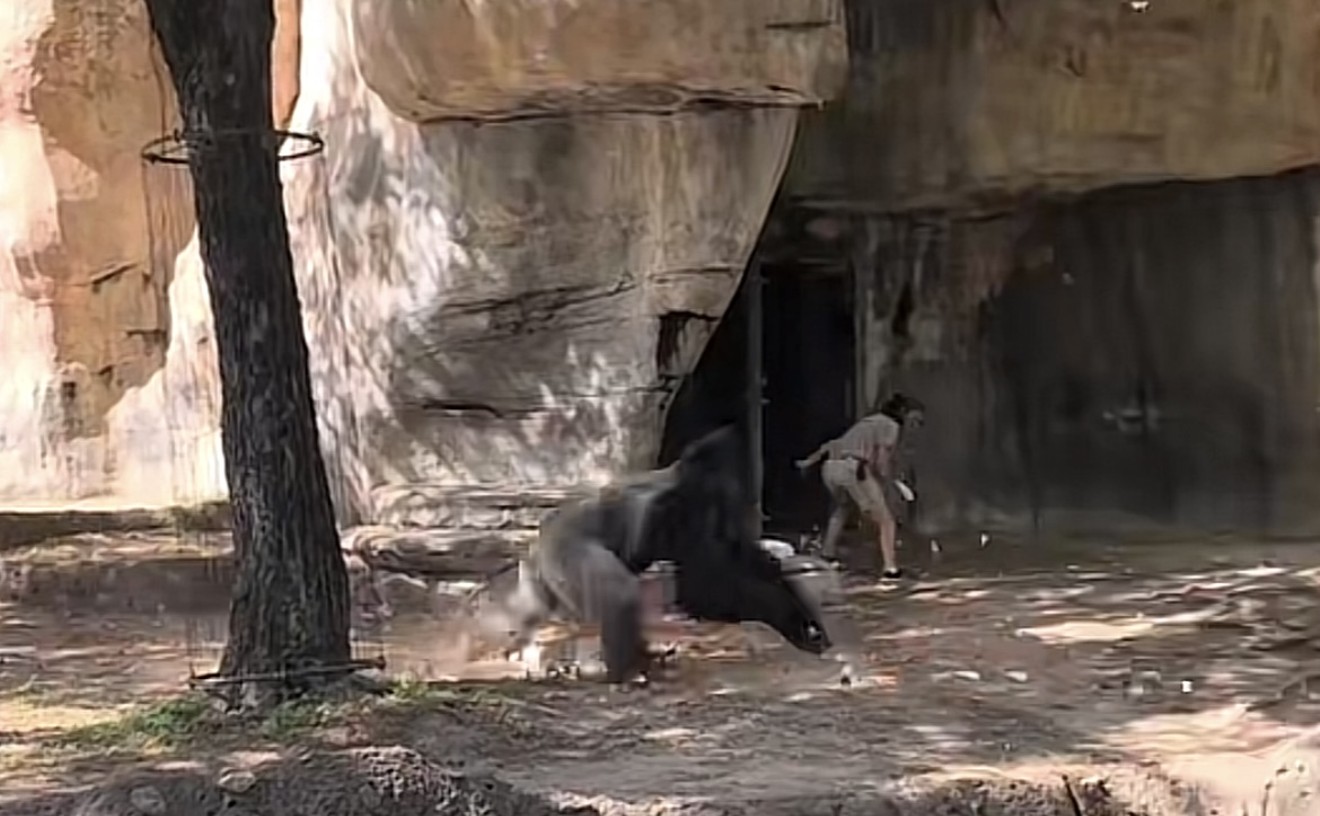"I'm looking through the pink of the water, through my own blood, and taking huge, huge, breaths of air," Rodney Fox says, "and through it, I see the head. Getting bigger."
It was December 1963. Fox was taking part in a spearfishing competition when a Great White shark plowed into him, grabbing his torso and dragging him below. It was a day that forever altered his course.
Fox was left with more than 360 stitches and a piece of tooth that is, a half century later, still embedded in his right wrist.
One might reasonably assume that, just by surviving such a horror show, a guy like Fox would spend the remainder of his life kissing dry ground and warning others to not "go in the water." Not Fox. He is today one of the world's foremost shark advocates, touring the world now as part of the Planet Shark: Predator of Prey exhibit, installed at the Museum of Nature & Science through September 16. This weekend he visits DFW to tell stories and to educate us about one of the last true predators.
See, Rodney Fox loves sharks. Just not when they're spleen-deep in him.
"I came away without really any long-lasting consequences," he says laughing heartily, "Except having to talk sharks for the next 50 years."
We caught up with Fox, who had just stepped off the plane at DFW to a relative heatwave. It is winter in his native Australia, and he wasn't prepared for what he laughingly calls a "nice, heated reception." This is his first time in Dallas, and he looks forward to a full weekend, with fans anxious to hear his stories, jokes and passionate history in person.
Considered worldwide a "miracle survivor," Fox's attack was one of the most severe non-fatal shark attacks on record. Every rib in his left side was crushed, his spleen was uncovered and he needed 90 stitches in his hand alone. And while "miracle" might sound a bit like a PR buzzword, it is clear that, to Fox, there is no other word to describe it.
In his estimation, it was a lot of inexplicable good fortune that kept him alive. Now, he sees helping sharks as his purpose; it's why he is still here.
Dragged 30 feet underwater and wounded, Fox fought back. He gouged the shark's eyes and bear hugged it. Soon, though, he needed air. He'd have to let go. He swam to the surface, gasping, and the shark followed. He counts the image of the shark's head, emerging through the water, as his most vivid memory of that day. It has followed him every day since.
Face to face, he kicked the shark, and by coincidence or fate, rather than grabbing hold of him again, it swallowed the fish float that was tied to Fox's body. Still attached, the shark towed him again through the water, but because the shark had already bitten about three quarters of the way through when it had bitten Fox's chest, the line snapped. "There are very few boats in these waters," Fox says, "But, a boat appeared. They had seen the pink in the water. They rolled me aboard and took me to hospital in record time. That was another miracle."
During recovery, he received letters and cards, chocolates and flowers. "I realized, this was an unusual event. It was an outpouring that wouldn't have happened had I been in a car wreck. Something about this affected people on a deep level."
But when Fox had recovered, he realized that though he'd made his life and his living as a diver, he was scared to go back. To quell the fear, he dedicated his life to research, conservation and science. He began working to help design and create the shark cages now firmly embedded in popular understanding. And he began a long career of documentary filmmaking, becoming involved in more than 100 documentaries that he estimates amount for about 90% of our knowledge about sharks. Today, his son Andrew is a scientist and part of the team. Fox says that the next step is designing a working but safe repellant. Thanks to today's global interconnectivity, he says that scientists around the world are working to create shark repellant. "Imagine," he says, "Going down with just a little black case clipped to your belt." It would change everything. In the 1970s, Fox worked on Jaws as a consultant, helping to organize shots of live sharks. He recalls how -- because special effects were in their nascent stages -- filmmakers utilized a little person in a half-sized cage in order to make a shark look as though it were thirty feet long, rather than its actual fifteen. But, Fox says he became a bit ashamed to have taken part in the film. "We scared people, and that's not what I want to do. I'm here because sharks need our understanding and respect."
Fox says it is unfortunate that sharks have garnered such a bad name and poor stereotypes. He says that many teachers and parents have approached him, grateful for the passionate interest that Planet Shark imparts. "We've noted that kids in Australia are getting better marks in school when they come to the talks and because of the interactive elements. Sharks are very popular with kids; parents tend to be much more afraid of sharks."
"When I was younger, the general thought was 'the best sharks are dead ones,' but that's not right. Sharks are the cornerstone predators of our oceans, applying pressure to other species of fish [helping to rarefy populations]. We need them."
Part of his work with Planet Shark means educating and entertaining -- never scaring. Before jet-setting again to Turkey, Fox will be available here in Dallas tonight for museum members and tomorrow during a meet and greet with the public at the cost of general museum admission, giving talks at 10:00, 12:30, 2:00 and 4:00. During his time here, Fox will be filmed by Nature Films Network for an update to their television movie, "The Fox and the Sharks." Visit the Museum of Nature and Science online for more details.










